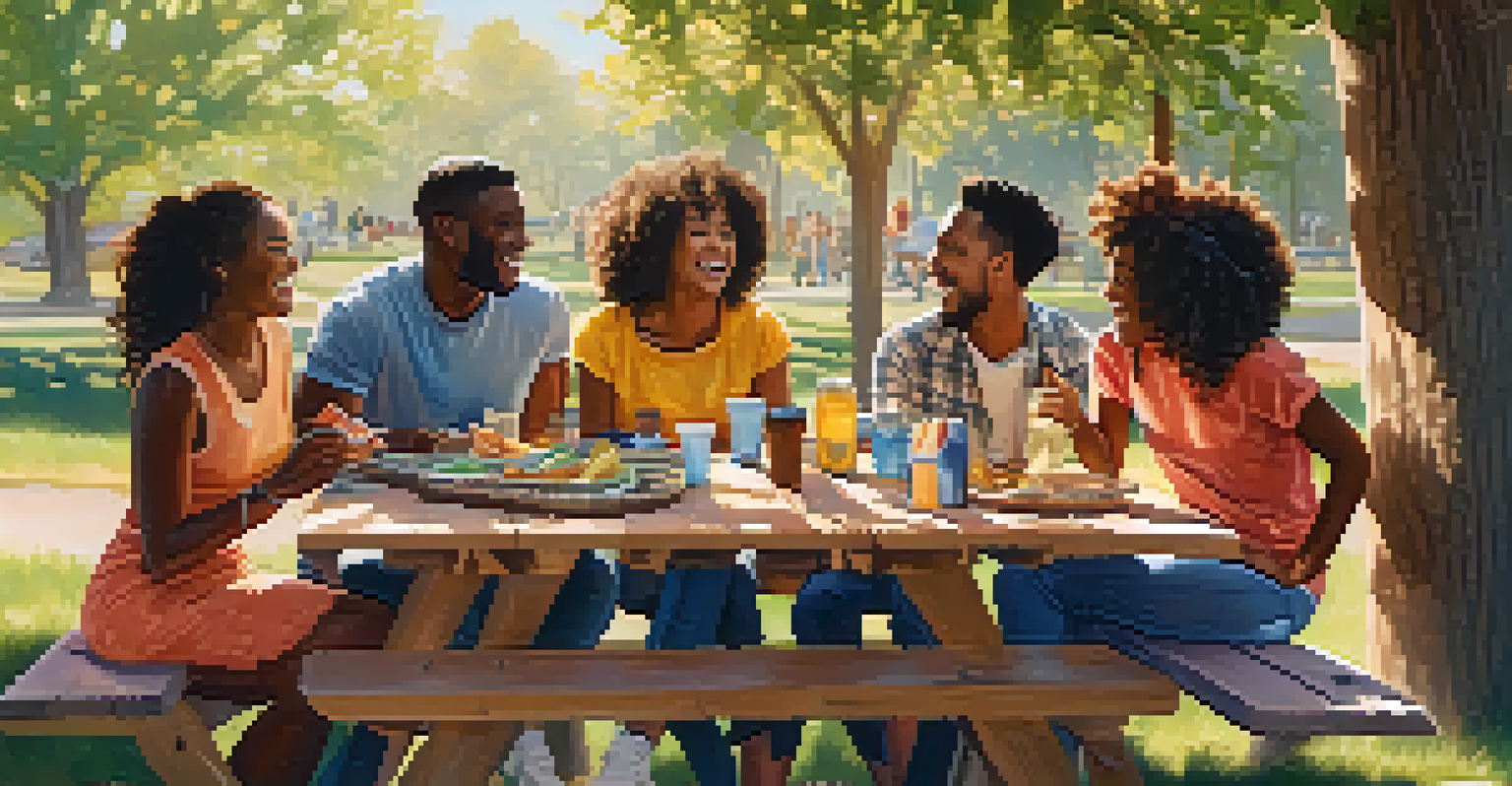Top 10 Social Skills to Enhance Your Personal Relationships

Active Listening: The Key to Meaningful Conversations
Active listening goes beyond just hearing words; it's about understanding the emotions and intentions behind them. When you truly listen, you validate the speaker's feelings, fostering a deeper connection. This skill encourages open dialogue and helps build trust, making the other person feel valued.
The most important thing in communication is hearing what isn’t said.
Imagine having a conversation where you’re not just waiting for your turn to speak but are genuinely engaged in what the other person is saying. This creates a safe space for sharing thoughts and feelings, enhancing the quality of your interactions. Active listening can turn a simple chat into a memorable exchange.
To practice active listening, focus on the speaker, avoid interruptions, and reflect back what you hear. Simple phrases like 'What I hear you saying is...' can demonstrate your engagement and encourage the other person to share more. Over time, this skill can transform your relationships.
Empathy: Understanding Others' Perspectives
Empathy is the ability to put yourself in someone else's shoes, and it's a crucial social skill for nurturing relationships. When you understand another person's feelings, you create a bond that fosters mutual respect and care. This skill not only helps in resolving conflicts but also deepens emotional connections.

Think about how comforting it is when someone genuinely understands your struggles. That feeling of being seen and heard can make all the difference in a relationship. Empathy allows you to respond to others in a way that acknowledges their feelings and experiences, making them feel valued.
Active Listening Builds Connections
Truly engaging in conversations fosters trust and makes others feel valued.
To enhance your empathy, practice asking open-ended questions and paying attention to non-verbal cues. This way, you can grasp the emotions behind words and respond appropriately. As you cultivate empathy, your relationships will likely become more fulfilling and supportive.
Effective Communication: The Art of Expression
Effective communication is about conveying your thoughts and feelings clearly while also being receptive to others. It involves choosing the right words, tone, and body language to express yourself authentically. This skill is essential for avoiding misunderstandings and fostering healthy interactions.
Empathy is about finding echoes of another person in yourself.
Imagine trying to explain your feelings but ending up sounding defensive or vague. This can lead to frustration for both you and the other person. By honing your communication skills, you can articulate your needs and desires more effectively, leading to clearer conversations and stronger connections.
To improve your communication, practice being concise while also being open to feedback. Engaging in conversations with a willingness to understand and adapt can make a huge difference. As you refine this skill, you'll find that relationships become easier and more fulfilling.
Non-Verbal Communication: The Power of Body Language
Non-verbal communication encompasses everything from facial expressions to gestures and posture. These cues can significantly impact the way your message is received and understood. Being aware of your body language helps you convey confidence and openness, enhancing your interactions.
Consider how a warm smile or open posture can create an inviting atmosphere. On the flip side, crossed arms or a lack of eye contact can convey disinterest or defensiveness. By being mindful of your non-verbal signals, you can foster a more positive environment for communication.
Empathy Strengthens Relationships
Understanding others' perspectives creates emotional bonds and mutual respect.
To improve your non-verbal communication, practice being present and aware of your body language. Mirroring the other person's gestures can create rapport and connection. As you work on this skill, you'll notice how it enriches your personal relationships.
Conflict Resolution: Turning Disagreements into Growth
Conflict is a natural part of any relationship, but how you handle it can make all the difference. Effective conflict resolution involves addressing issues calmly and respectfully, focusing on solutions rather than blame. This skill can lead to personal growth and deeper understanding between individuals.
Think about a time when a disagreement escalated because no one was willing to listen. By approaching conflicts with an open mind and a willingness to compromise, you can transform a potentially damaging situation into an opportunity for growth and connection. This not only resolves the immediate issue but also strengthens your relationship.
To enhance your conflict resolution skills, practice active listening and seek to understand the other person's perspective. Using 'I' statements can help express your feelings without sounding accusatory. Over time, these techniques can make conflict a constructive part of your relationships.
Trust Building: The Foundation of Strong Relationships
Trust is the cornerstone of any healthy relationship. It develops over time through consistent actions, honesty, and reliability. Building trust involves being transparent and following through on promises, leading to a sense of security and mutual respect.
Imagine a relationship where you can count on someone to support you, no matter what. This sense of dependability fosters deeper connections and allows both parties to be vulnerable. When trust is established, it creates an environment where both individuals can thrive together.
Trust is Essential for Growth
Building trust through consistency and honesty lays the foundation for resilient relationships.
To build trust, focus on being dependable and open in your communications. Acknowledge mistakes and own up to them, as this demonstrates integrity. As you nurture trust in your relationships, you'll likely find them becoming more robust and resilient.
Adaptability: Navigating Change in Relationships
Adaptability is the ability to adjust to new circumstances and changes, which is vital in personal relationships. Life is unpredictable, and being flexible can help you navigate challenges more smoothly. This skill allows you to embrace change rather than resist it, strengthening your relationships.
Consider how adapting to a partner's changing needs can enhance your bond. By being open to new experiences and perspectives, you can create a more dynamic and fulfilling relationship. Adaptability encourages growth, both individually and as a couple or group.

To cultivate adaptability, practice being open-minded and willing to compromise. Embracing change as an opportunity for growth can shift your perspective. As you develop this skill, you'll find that your relationships can flourish even in the face of challenges.
Positivity: Cultivating a Supportive Atmosphere
A positive attitude can significantly impact your relationships, creating an environment where everyone feels supported and uplifted. Positivity involves not only maintaining an optimistic outlook but also encouraging others to do the same. This skill can transform interactions and foster resilience during tough times.
Think about how infectious a positive attitude can be. When you radiate positivity, it can uplift those around you and create a sense of camaraderie. By fostering an encouraging atmosphere, you can strengthen your connections and make your relationships more enjoyable.
To cultivate positivity, practice gratitude and focus on the good things in your life. Sharing uplifting thoughts and celebrating others' achievements can create a ripple effect of positivity. As you embrace this skill, you'll likely see your relationships thrive.